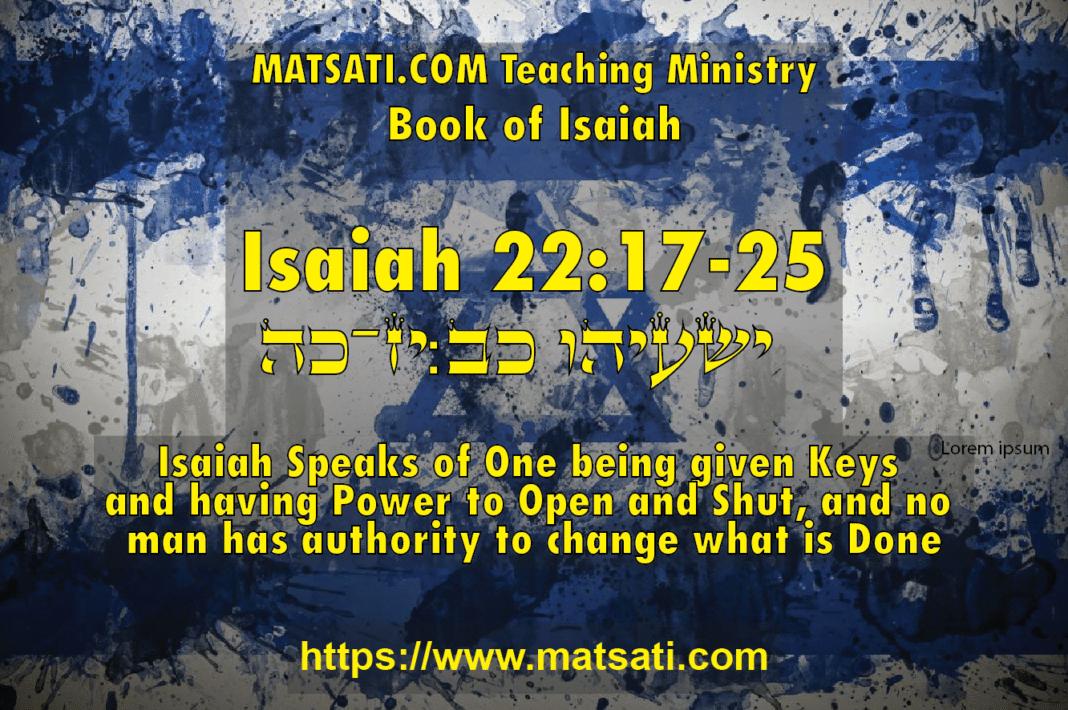Isaiah 22:17-25
Here Isaiah continues speaking of how Shebnah will be taken and carried away to die in a foreign land. These verses are believed to be directed to Shebnah and as a prediction of what is to come. Isaiah continues saying the following:
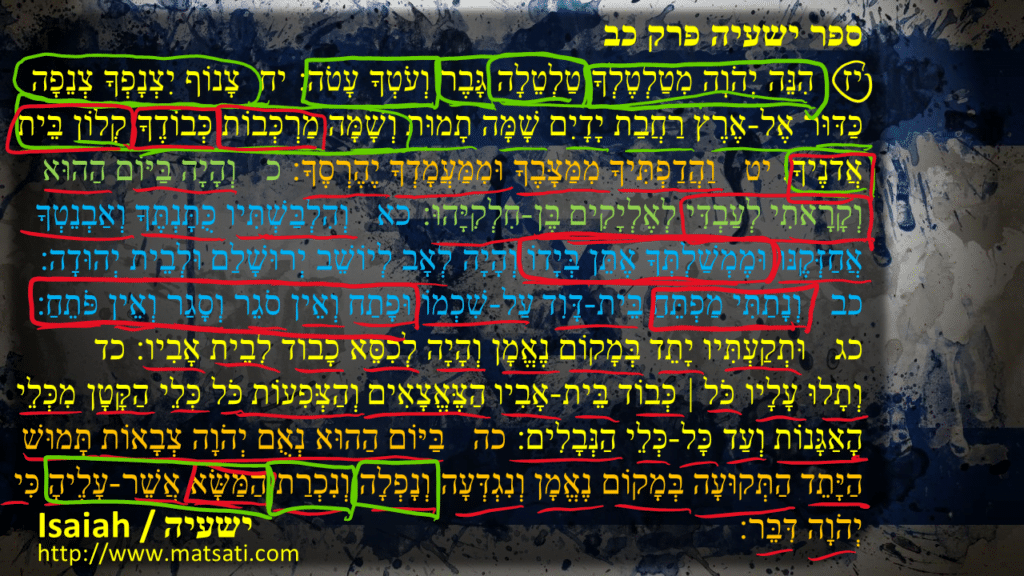
ספר ישעיה פרק כב
יז הִנֵּה יְהֹוָה מְטַלְטֶלְךָ טַלְטֵלָה גָּבֶר וְעֹטְךָ עָטֹה: יח צָנוֹף יִצְנָפְךָ צְנֵפָה כַּדּוּר אֶל-אֶרֶץ רַחֲבַת יָדָיִם שָׁמָּה תָמוּת וְשָׁמָּה מַרְכְּבוֹת כְּבוֹדֶךָ קְלוֹן בֵּית אֲדֹנֶיךָ:
Isaiah 22:17 states, “Behold, the LORD will carry thee away with a mighty captivity, and will surely cover thee. (הִנֵּה יְהֹוָה מְטַלְטֶלְךָ טַלְטֵלָה גָּבֶר וְעֹטְךָ עָטֹה)” Isaiah 22:18 “He will surely violently turn and toss thee like a ball into a large country: (צָנוֹף יִצְנָפְךָ צְנֵפָה כַּדּוּר אֶל-אֶרֶץ רַחֲבַת יָדָיִם) there shalt thou die, and there the chariots of thy glory shall be the shame of thy lord’s house. (שָׁמָּה תָמוּת וְשָׁמָּה מַרְכְּבוֹת כְּבוֹדֶךָ קְלוֹן בֵּית אֲדֹנֶיךָ)” So here is a direct declaration of Divine punishment according to Isaiah 22:17-18. Here Isaiah writes הִנֵּה יְהֹוָה מְטַלְטֶלְךָ “behold HaShem will violently eject you.” The idea we get from this verbiage is of rejection, how a CD is automatically ejected from the drive due to corruption of the media. We note the repetition in 22:17, מְטַלְטֶלְךָ טַלְטֵלָה and וְעֹטְךָ עָטֹה which is meant for emphasis. Isaiah says that the strong man will be violently ejected (טַלְטֵלָה גָּבֶר) and “seize/take hold of you, seize/take hold” (וְעֹטְךָ עָטֹה). The implication is that the Lord God Almighty will seize and carry away the one who is filled with pride! These things illustrate the dangers of pride and why we should always be on our guard against such things. Comparison of Isaiah 22:17 to LXX, TgJ, and L-Peshitta is as follows:

We can visually see the almost word for word translation of the MSS into the Aramaic TgJ. The Linden Peshitta writes ܡܫܕܐ ܫ̇ܕܐ the Lord will “cast away” and ܘܡܛܥܐ ܛܥ̇ܐ ܠܟ “will lead you astray.” Note how the Lord God is doing this shaking, and the one who is filled with pride will be led astray by God Himself! How serious is this situation that one might find his or herself in if one allows pride to prevail? Note the mighty man גָּבֶר is unable to stand, he is hurled from the sense of being kicked, considering what is written in Isaiah 22:18. We see the repetition of these three words צָנ֤וֹף יִצְנָפְךָ֙ צְנֵפָ֔ה in which the KJV translates as “He will surely violently turn and toss thee like a ball.” Isaiah goes on saying וְשָׁ֙מָּה֙ מַרְכְּב֣וֹת כְּבוֹדֶ֔ךָ קְל֖וֹן בֵּ֥ית אֲדֹנֶֽיךָ “and there the chariots of thy glory shall be the shame of thy lord’s house.” Chariots (רֶכֶב) are a lightweight, two-wheeled, horse-drawn cart used for transportation and, in war, such as being as a mobile archery firing platform, commonly used in ancient Near Eastern warfare from around the 18th century BC to the first century AD. The chariot was an important military vehicle in the ancient world, and the Tanakh refers to chariots over 160 times. Chariots first appear in the story about Joseph in Bereshit / Genesis 41:43 which describes how Pharaoh made Joseph ride “in his second chariot,” a position of prestige and power, and later in Bereshit / Genesis 46:29 Joseph goes out in his own chariot to meet his father. Chariots are also connected to Egypt in the exodus narrative, as Pharaoh chased the Israelites with his chariots, which subsequently became bogged down in the mud (see Shemot / Exodus 14:1-31). Elsewhere chariots are described in battles. Judges 4 and 5 describe the chariot armies of Sisera being defeated by Barak. In the book of 2 Samuel, David is described as “hamstringing chariot horses,” with the exception of enough to pull 100 chariots (see 2 Samuel 8:4). Many of the biblical references to chariots occur in the books of 1–2 Kings, the major point is that these things describe military strength and prestige and glory. This is how Isaiah places a spin on these concepts saying וְשָׁ֙מָּה֙ מַרְכְּב֣וֹת כְּבוֹדֶ֔ךָ קְל֖וֹן בֵּ֥ית אֲדֹנֶֽיךָ “and there the chariots of thy glory shall be the shame of thy lord’s house.” Ultimately, due to pride, the outcome is shame, regardless of how massive one’s army is which is described as “the chariots of thy glory.”
ספר ישעיה פרק כב
יט וַהֲדַפְתִּיךָ מִמַּצָּבֶךָ וּמִמַּעֲמָדְךָ יֶהֶרְסֶךָ:
Isaiah 22:19 states, “And I will drive thee from thy station, and from thy state shall he pull thee down. (וַהֲדַפְתִּיךָ מִמַּצָּבֶךָ וּמִמַּעֲמָדְךָ יֶהֶרְסֶךָ)” Here this is believed to be Shebna, his pride led to his losing his position “over the house” as Isaiah 36:3 and 36:22 seem to indicate finally took place. John Oswalt states that Shebna was demoted to secretary, and Eliakim was elevated in his place. We note how these things illustrate something very important. What we see going on today, how evil officials who are in office here in the USA continue to get reelected, and are always able to maintain their office, or after their term is up being promoted to some other high position. This is exactly what we see going on here with Shebna as secretary where the bureaucrat is able to retain some form of hold on government, the titles change but the faces remain the same working in the background. As we proceed to Isaiah 22:20-24, the prophet Isaiah focuses on Eliakim, Shebna’s successor. We note how a comparison is made and how Shebna would grind his teeth in envy for the powers that he lost which were given to another. Eliakim has both faithfulness and character, things which were absent in Shebna. Isaiah continues saying the following according to Isaiah 22:20.
ספר ישעיה פרק כב
כ וְהָיָה בַּיּוֹם הַהוּא וְקָרָאתִי לְעַבְדִּי לְאֶלְיָקִים בֶּן-חִלְקִיָּהוּ:
Isaiah 22:20 states, “And it shall come to pass in that day, that I will call my servant Eliakim the son of Hilkiah: (וְהָיָה בַּיּוֹם הַהוּא וְקָרָאתִי לְעַבְדִּי לְאֶלְיָקִים בֶּן-חִלְקִיָּהוּ)” Eliakim, son of Hilkiah (אֶלְיָקִים, elyaqim) was one of the officers sent by Hezekiah to meet Sennacherib’s Assyrian envoy from Lachish (2 Kgs 18:18-37, Isiah 36:1-22). These events surround the following Scriptures:
- Sennacherib’s Campaign Against Judah, 2 Kings 18:13-19:7, 20:20, 2 Chronicles 32:1-19, 32:30, Isaiah 22:9-11, 36:1-37:7
- Sennacherib Threatens Jerusalem, 2 Kings 18:17-37, 2 Chronicles 32:9-19, Isaiah 36:2-22
- Isaiah Reassures Hezekiah, 2 Kings 19:1-7, Isaiah 37:1-7
We note Isaiah states, וְקָרָאתִי לְעַבְדִּי “I call my servant” is a powerful title that God gives to Eliakim. We remember that this title occurs first to Isaiah in Isaiah 20:3, and then to all of Israel according to Chapters 40-55, 65, and 66, and including the suffering servant in Isaiah 53. Those who belong to God are His servants who are used by His hand to do what He wants. These are those who enjoy the grace and mercy of God in their lives, and who have a peace that surpasses all understanding, just as we read according to the Apostolic Writings! Isaiah continues saying the following according to Isaiah 22:21-22.
ספר ישעיה פרק כב
כא וְהִלְבַּשְׁתִּיו כֻּתָּנְתֶּךָ וְאַבְנֵטְךָ אֲחַזְּקֶנּוּ וּמֶמְשַׁלְתְּךָ אֶתֵּן בְּיָדוֹ וְהָיָה לְאָב לְיוֹשֵׁב יְרוּשָׁלַם וּלְבֵית יְהוּדָה: כב וְנָתַתִּי מַפְתֵּחַ בֵּית-דָּוִד עַל-שִׁכְמוֹ וּפָתַח וְאֵין סֹגֵר וְסָגַר וְאֵין פֹּתֵחַ:
Isaiah 22:21 states, “And I will clothe him with thy robe, and strengthen him with thy girdle, and I will commit thy government into his hand: (וְהִלְבַּשְׁתִּיו כֻּתָּנְתֶּךָ וְאַבְנֵטְךָ אֲחַזְּקֶנּוּ וּמֶמְשַׁלְתְּךָ אֶתֵּן בְּיָדוֹ) and he shall be a father to the inhabitants of Jerusalem, and to the house of Judah. (וְהָיָה לְאָב לְיוֹשֵׁב יְרוּשָׁלַם וּלְבֵית יְהוּדָה)” Isaiah 22:22 “And the key of the house of David will I lay upon his shoulder; so he shall open, and none shall shut; and he shall shut, and none shall open. (וְנָתַתִּי מַפְתֵּחַ בֵּית-דָּוִד עַל-שִׁכְמוֹ וּפָתַח וְאֵין סֹגֵר וְסָגַר וְאֵין פֹּתֵחַ)” The Greek text translates this portion of the Hebrew bible almost word for word. The idea is that Eliakim will be empowered with strength and authority. The idea of וְהִלְבַּשְׁתִּיו כֻּתָּנְתֶּךָ וְאַבְנֵטְךָ אֲחַזְּקֶנּוּ “And I will clothe him with thy robe, and strengthen him with thy girdle” suggests that these officials wore specific cloths to indicate their rank in office. God also says וּמֶמְשַׁלְתְּךָ אֶתֵּן בְּיָדוֹ that he will give into his hand military strength. There is an interesting phrase according to Isaiah 22:22 which states the kind of authority being given to this man by God saying, וְנָתַתִּי מַפְתֵּחַ בֵּית-דָּוִד עַל-שִׁכְמוֹ וּפָתַח וְאֵין סֹגֵר וְסָגַר וְאֵין פֹּתֵחַ “And the key of the house of David will I lay upon his shoulder; so he shall open, and none shall shut; and he shall shut, and none shall open.” We note how this has a messianic flavor to it according to the interpretation by the Apostolic Writings on Isaiah 22:22 and Revelation 3:7.

ספר ישעיה פרק כב
וְנָתַתִּ֛י מַפְתֵּ֥חַ בֵּית־דָּוִ֖ד עַל־שִׁכְמ֑וֹ וּפָתַח֙ וְאֵ֣ין סֹגֵ֔ר וְסָגַ֖ר וְאֵ֥ין פֹּתֵֽחַ׃
ספר הַהִתְגַּלּוּת פרק ג
ז אֶל מַלְאַךְ קְהִלַּת פִילָדֶלְפִיָה כְּתֹב׃ אֶת אֵלֶּה הַדְּבָרִים אוֹמֵר הַקָּדוֹשׁ, הָאֲמִתִּי, אֲשֶׁר לוֹ מַפְתֵּחַ דָּוִד, הַפּוֹתֵחַ וְאֵין סוֹגֵר וְסוֹגֵר וְאֵין פּוֹתֵחַ׃ (ישעיהו כב׳ כב׳)
Revelation 3:7
3:7 And to the angel of the church in Philadelphia write; These things saith he that is holy, he that is true, he that hath the key of David, he that openeth, and no man shutteth; and shutteth, and no man openeth; (KJV, ܘܰܠܡܰܠܱܐܟ݂ܳܐ ܕ݁ܥܺܕ̱݁ܬܴ݁ܐ ܕ݁ܦ݂ܺܝܠܱܕ݂ܶܠܦ݂ܺܝܰܐ ܟ݁ܬ݂ܾܘܒ݂ ܆ ܗܳܟ݂ܰܢܳܐ ܐܴܡܰܪ ܩܰܕܻ݁ܝܫܳܐ ܫܰܪܻܝܪܴܐ ܞ ܗܰܘ ܕܻ݁ܐܝܬ݂ ܠܷܗ ܩܠܻܝ̈ܕ݂ܶܐ ܕ݁ܕ݂ܰܘܺܝܕ݂ ܂ ܐܱܝܢܳܐ ܕ݁ܦ݂ܳܬ݂ܱܚ ܘܠܱܝܬ݁ ܕܴ݁ܐܚܶܕ݂ ܂ ܘܳܐܚܶܕ݂ ܘܠܱܝܬ݁ ܕ݁ܦ݂ܳܬ݂ܱܚ ܂ Καὶ τῷ ἀγγέλῳ τῆς ἐν Φιλαδελφίᾳ ἐκκλησίας γράψον· τάδε λέγει ὁ ἅγιος, ὁ ἀληθινός, ὁ ἔχων τὴν κλεῖν Δαυίδ, ὁ ἀνοίγων καὶ οὐδεὶς κλείσει καὶ κλείων καὶ οὐδεὶς ἀνοίγει)
We note here that Yeshua is the one who is given these keys, and has the power to open or shut and no man has authority to change what he does! Eliakim וְהָיָה לְאָב לְיוֹשֵׁב יְרוּשָׁלַם וּלְבֵית יְהוּדָה “being a father to those who dwell in Jerusalem and to the house of Judah,” suggests that he will be the true governor to the people. This draws a parallel to the Isaiah 9:5 text as this connects us back to the Messiah of Israel, and to Revelation 3:7 text. What is being expressed here is of the care and nurturing of this person as a father does to his son. He is not operating in pride, and so what he does is not in vain but for the benefit of the people. In the rule of Eliakim, we find a type of Messiah, who would provide hope for the people. Having the keys given suggest that he has the right to allow / permit or disallow one from seeing the king. Note the parallel to the king Messiah who has the power to permit us to stand before our Father in heaven! These are powerful analogies and illustrate the thrust of the message that Isaiah is putting forward here in regard to pride, repentance, and the mercy and forgiveness of God. These things are very similar to what Yeshua says according to Matthew 16:18-19.
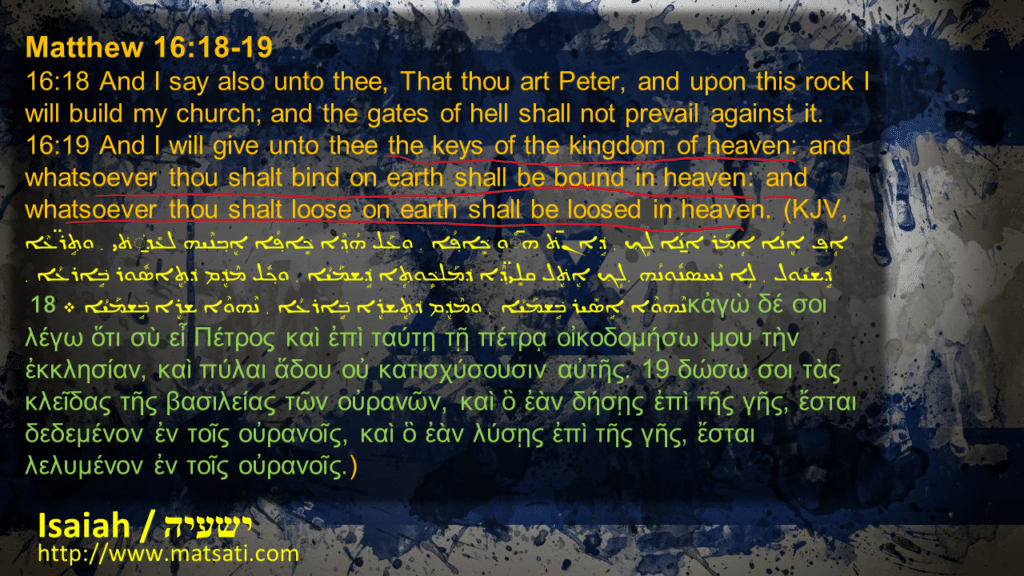
Matthew 16:18-19
16:18 And I say also unto thee, That thou art Peter, and upon this rock I will build my church; and the gates of hell shall not prevail against it. 16:19 And I will give unto thee the keys of the kingdom of heaven: and whatsoever thou shalt bind on earth shall be bound in heaven: and whatsoever thou shalt loose on earth shall be loosed in heaven. (KJV, ܐܴܦ݂ ܐܷܢܳܐ ܐܴܡܰܪ ܐ̱ܢܳܐ ܠܴܟ݂ ܂ ܕܱ݁ܐܢ̄ܬ݁ ܗ̄ܽܘ ܟܻ݁ܐܦ݂ܳܐ ܂ ܘܥܰܠ ܗܳܕ݂ܶܐ ܟܻ݁ܐܦ݂ܳܐ ܐܷܒ݂ܢܶܝܗ ܠܥܺܕ̱݁ܬ݁ܝ ܂ ܘܬ݂ܱܪ̈ܥܶܐ ܕܱ݁ܫܝܽܘܠ ܂ ܠܴܐ ܢܶܚܣܢܽܘܢܳܗ ܂ܠܴܟ݂ ܐܷܬܷ݁ܠ ܩܠܻܝ̈ܕ݂ܶܐ ܕ݁ܡܰܠܟܾ݁ܘܬ݂ܴܐ ܕܱ݁ܫܡܰܝܳܐ ܂ ܘܟ݂ܽܠ ܡܶܕܷ݁ܡ ܕ݁ܬ݂ܷܐܣܽܘܪ ܒܱ݁ܐܪܥܳܐ ܂ ܢܶܗܘܶܐ ܐܱܣܺܝܪ ܒܱ݁ܫܡܰܝܳܐ ܂ ܘܡܶܕܷ݁ܡ ܕ݁ܬ݂ܷܫܪܷܐ ܒܱ݁ܐܪܥܳܐ ܂ ܢܶܗܘܶܐ ܫܪܷܐ ܒܱ݁ܫܡܰܝܳܐ ܀ 18 κἀγὼ δέ σοι λέγω ὅτι σὺ εἶ Πέτρος καὶ ἐπὶ ταύτῃ τῇ πέτρᾳ οἰκοδομήσω μου τὴν ἐκκλησίαν, καὶ πύλαι ἅδου οὐ κατισχύσουσιν αὐτῆς. 19 δώσω σοι τὰς κλεῖδας τῆς βασιλείας τῶν οὐρανῶν, καὶ ὃ ἐὰν δήσῃς ἐπὶ τῆς γῆς, ἔσται δεδεμένον ἐν τοῖς οὐρανοῖς, καὶ ὃ ἐὰν λύσῃς ἐπὶ τῆς γῆς, ἔσται λελυμένον ἐν τοῖς οὐρανοῖς.)
These are the things that Yeshua was showing to his Disciples in regards to the depth of His authority to do these things as the Messiah of God! Isaiah goes on saying the following according to Isaiah 22:23-24.
ספר ישעיה פרק כב
כג וּתְקַעְתִּיו יָתֵד בְּמָקוֹם נֶאֱמָן וְהָיָה לְכִסֵּא כָבוֹד לְבֵית אָבִיו: כד וְתָלוּ עָלָיו כֹּל | כְּבוֹד בֵּית-אָבִיו הַצֶּאֱצָאִים וְהַצְּפִעוֹת כֹּל כְּלֵי הַקָּטָן מִכְּלֵי הָאַגָּנוֹת וְעַד כָּל-כְּלֵי הַנְּבָלִים:
Isaiah 22:23 states, “And I will fasten him as a nail in a sure place; and he shall be for a glorious throne to his father’s house. (וּתְקַעְתִּיו יָתֵד בְּמָקוֹם נֶאֱמָן וְהָיָה לְכִסֵּא כָבוֹד לְבֵית אָבִיו)” Isaiah 22:24 “And they shall hang upon him all the glory of his father’s house, (וְתָלוּ עָלָיו כֹּל | כְּבוֹד בֵּית-אָבִיו) the offspring and the issue, all vessels of small quantity, from the vessels of cups, even to all the vessels of flagons. (הַצֶּאֱצָאִים וְהַצְּפִעוֹת כֹּל כְּלֵי הַקָּטָן מִכְּלֵי הָאַגָּנוֹת וְעַד כָּל-כְּלֵי הַנְּבָלִים)” This is really interesting when we compare the LXX, the TgJ, and the Peshitta translations of these verses to the MSS Hebrew Bible.
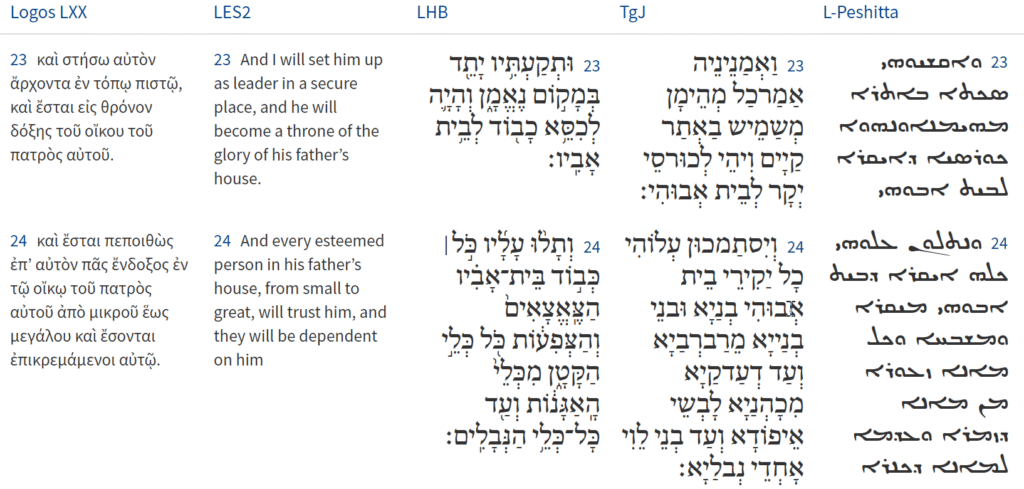
We note the Greek translation writes καὶ στήσω αὐτὸν ἄρχοντα ἐν τόπῳ πιστῷ “and will make him a faithful leader” and καὶ ἔσται εἰς θρόνον δόξης τοῦ οἴκου τοῦ πατρὸς αὐτοῦ “and he will become a throne of glory of his father’s house.” The LXX translates this consistently with the MSS, and it is interesting how he will become a throne of glory to his father’s house. The TgJ writes “And I will place the key of the house of the sanctuary, and the government of the house of David, in his hand; and he shall open, and none shall shut; and he shall shut, and none shall open. And I will appoint him a faithful chief-governor, an officer in a firm place, and he shall be for a glorious throne to his father’s house. All the nobles of his father’s house shall rest themselves upon him, children, and children’s children, from young men to little ones, from the priests clothed with the ephod to the Levites that are holding the lyres.” These things remind us of the kingdom of God, which establishes the conditions of God’s rule over all of mankind. We are told in the NT that all authority and power has now been placed under Yeshua’s hand who establishes God’s rule in our lives according to His Torah, as Paul wrote in Romans 3:31 we establish Torah in the Messiah Yeshua! We note that in Isaiah’s time, Eliakim will be the one through whom his people would be honored, and upon him the people will be lifted up so that they can rest with confidence in his rule. Today we have Yeshua who was lifted up and glorified, where it is through Him, we are established, and the family of God is lifted up, and upon whom we can have confidence in and trust, and the hope of God! We note how the LXX writes, καὶ ἔσται πεποιθὼς ἐπʼ αὐτὸν πᾶς ἔνδοξος ἐν τῷ οἴκῳ τοῦ πατρὸς αὐτοῦ ἀπὸ μικροῦ ἕως μεγάλου καὶ ἔσονται ἐπικρεμάμενοι αὐτῷ “every esteemed person in his father’s house will trust him and they will be dependent on him.” This provides a future expectation for the coming Messiah, the One who would save us from our sins! Isaia goes on saying the following according to Isaiah 22:25.
ספר ישעיה פרק כב
כה בַּיּוֹם הַהוּא נְאֻם יְהֹוָה צְבָאוֹת תָּמוּשׁ הַיָּתֵד הַתְּקוּעָה בְּמָקוֹם נֶאֱמָן וְנִגְדְּעָה וְנָפְלָה וְנִכְרַת הַמַּשָּׂא אֲשֶׁר-עָלֶיהָ כִּי יְהֹוָה דִּבֵּר:
Isaiah 22:25 states, “In that day, saith the LORD of hosts, shall the nail that is fastened in the sure place be removed, and be cut down, and fall; (בַּיּוֹם הַהוּא נְאֻם יְהֹוָה צְבָאוֹת תָּמוּשׁ הַיָּתֵד הַתְּקוּעָה בְּמָקוֹם נֶאֱמָן וְנִגְדְּעָה וְנָפְלָה) and the burden that was upon it shall be cut off: for the LORD hath spoken it. (וְנִכְרַת הַמַּשָּׂא אֲשֶׁר-עָלֶיהָ כִּי יְהֹוָה דִּבֵּר)” This verse does seem a bit out of place, commentators have difficulty with this verse. It seems as if Eliakim who was so lifted up and empowered, how could he fall and be cut down? This may suggest a comparison to the messianic expectation of Isaiah 9:5 where his kingdom will be established forever, whereas the kingdom of man will be finite! This is consistent with the narrative of Isaiah thus far, how we are to trust in the Lord God in heaven and not in man. The nation that places their trust in man will fail, and this may be what Isaiah is pointing out, regardless of how blessed and elevated a person is by God, we are to trust in God and not in man! A nations only hope was in the Lord, not in the men and women who hold political office, positions of power. Like Judah, if we refuse to trust in God and instead trust in human leaders or foreign nations, inevitably we will be disappointed, and worse yet, utterly destroyed, just as Israel, Judah, and Jerusalem faced in the days of Isaiah the prophet! Thank God for the wonderful hope that we have in Yeshua the Messiah, whose kingdom is established forever and ever! In Him we can truly trust, and we truly have our hope! Baruch HaShem!
Rabbinic Commentary
The Targum Jonathan is an Aramaic and Rabbinic translation of the book of Isaiah and is therefore a very important resource for us to study as we study the book of Isaiah!
תרגום יונתן בן עוזיאל אל ישעיה פרק כב:יז-כה
יז הָא יוי מְטַלטֵיל לָך טִלטוּל דְגִיבָר וְתִחפֵינָך בַהתָא׃ יח יַעדֵי מִינָך יָת מַצנַפתָא וְיַקְפוּנָך בַעְלֵי דְבָב כְשוּר מַקַף וְיַגלֵינָך לַאְרַע פַתיוּת יְדִין תַמָן תְמוּת וּלתַמָן רְתִיכֵי יְקָרָך יְתוּבָן בִקלַן עַל דְלָא טַמַרתָא יְקָר בֵית רִבֹונָך׃ יט וְאַדחֵינָך מִמְקָמָך וּמִשִימוּשָך אְמַגְרִינָך׃ כ וִיהֵי בְעִידָנָא הַהוּא וַאְרַבֵי לְעַבדִי לְאַליָקִים בַר חִלקִיָה׃ כא וְאַלבְשִינֵיה כִיתוּנָך וְהִמיָנָך אְזָרְזִנֵיה וְשֻלטָנָך אַתֵין בִידֵיה וִיהֵי לְאָב לְיָתְבֵי יְרוּשלַם וּלבֵית יְהוּדָה׃ כב וְאַתֵין מַפתַח בֵית מַקדְשָא וְשֻלטָן בֵית דָוִד בִידֹוהִי וְיִפתַח וְלֵית דְאָחֵיד וְיֵיחֹוד וְלֵית דְפָתַח׃ כג וַאְמַנֵינֵיה אַמַרכַל מְהֵימָן מְשַמֵיש בַאְתַר קַיָים וִיהֵי לְכוּרסֵי יְקָר לְבֵית אְבוּהִי׃ כד וְיִסתַמכוּן עְלֹוהִי כָל יַקִירֵי בֵית אְבוּהִי בְנַיָא וּבנֵי בְנַייָא מֵרַברְבַיָא וְעַד דְעַדקַיָא מִכָהְנַיָא לָבְשֵי אֵיפֹודָא וְעַד בְנֵי לֵוִי אָחְדֵי נְבלַיָא׃ כה בְעִידָנָא הַהוּא אְמַר יוי צְבָאֹות יִעדֵי אַמַרכַל מְהֵימָן מְשַמֵיש בַאְתַר קַייָם וְיִתקְטֵיף וְיִפֹול וְתִבטַל מַטַל נְבוּאְתָא דַעְלֹוהִי אְרֵי בְמֵימְרָא דַיוי גְזִיר כֵין׃
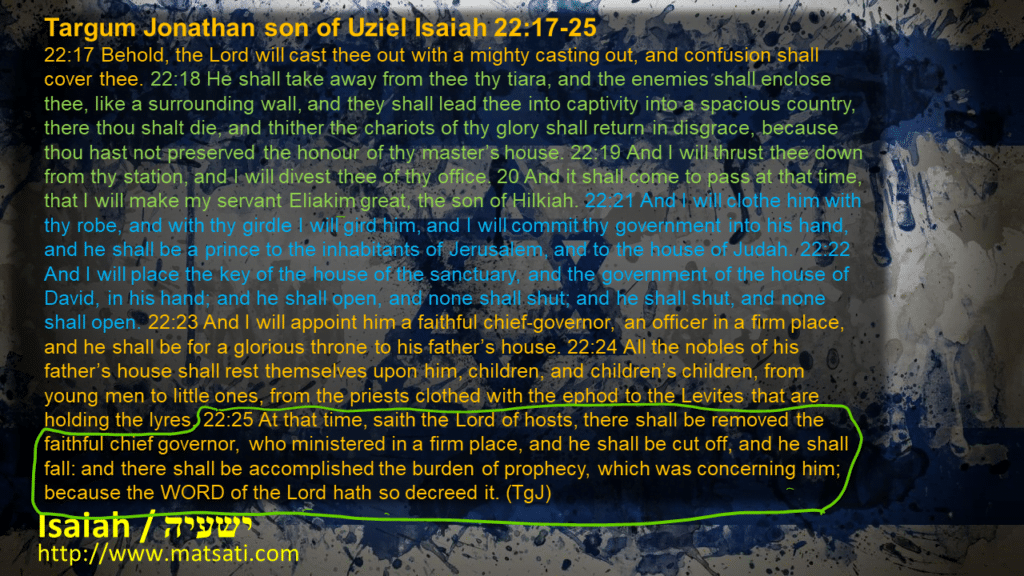
Targum Jonathan son of Uziel Isaiah 22:17-25
22:17 Behold, the Lord will cast thee out with a mighty casting out, and confusion shall cover thee. 22:18 He shall take away from thee thy tiara, and the enemies shall enclose thee, like a surrounding wall, and they shall lead thee into captivity into a spacious country, there thou shalt die, and thither the chariots of thy glory shall return in disgrace, because thou hast not preserved the honour of thy master’s house. 22:19 And I will thrust thee down from thy station, and I will divest thee of thy office. 20 And it shall come to pass at that time, that I will make my servant Eliakim great, the son of Hilkiah. 22:21 And I will clothe him with thy robe, and with thy girdle I will gird him, and I will commit thy government into his hand, and he shall be a prince to the inhabitants of Jerusalem, and to the house of Judah. 22:22 And I will place the key of the house of the sanctuary, and the government of the house of David, in his hand; and he shall open, and none shall shut; and he shall shut, and none shall open. 22:23 And I will appoint him a faithful chief-governor, an officer in a firm place, and he shall be for a glorious throne to his father’s house. 22:24 All the nobles of his father’s house shall rest themselves upon him, children, and children’s children, from young men to little ones, from the priests clothed with the ephod to the Levites that are holding the lyres. 22:25 At that time, saith the Lord of hosts, there shall be removed the faithful chief governor, who ministered in a firm place, and he shall be cut off, and he shall fall: and there shall be accomplished the burden of prophecy, which was concerning him; because the WORD of the Lord hath so decreed it. (TgJ)
The Psalmist writes according to Tehillim / Psalms 34:16 the following:
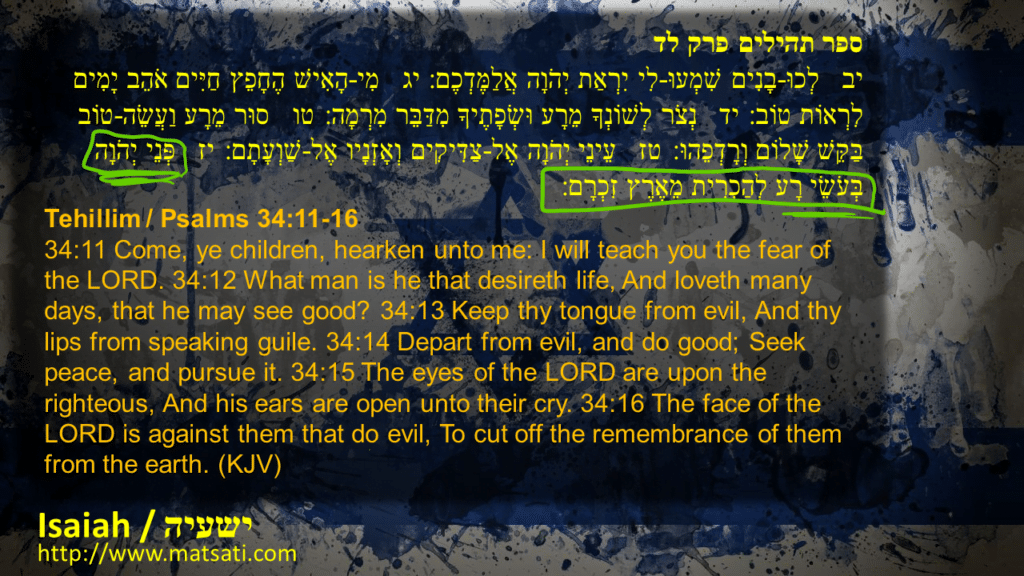
ספר תהילים פרק לד
יב לְכוּ-בָנִים שִׁמְעוּ-לִי יִרְאַת יְהֹוָה אֲלַמֶּדְכֶם: יג מִי-הָאִישׁ הֶחָפֵץ חַיִּים אֹהֵב יָמִים לִרְאוֹת טוֹב: יד נְצֹר לְשׁוֹנְךָ מֵרָע וּשְֹפָתֶיךָ מִדַּבֵּר מִרְמָה: טו סוּר מֵרָע וַעֲשֵֹה-טוֹב בַּקֵּשׁ שָׁלוֹם וְרָדְפֵהוּ: טז עֵינֵי יְהֹוָה אֶל-צַדִּיקִים וְאָזְנָיו אֶל-שַׁוְעָתָם: יז פְּנֵי יְהֹוָה בְּעֹשֵֹי רָע לְהַכְרִית מֵאֶרֶץ זִכְרָם:
Tehillim / Psalms 34:11-16
34:11 Come, ye children, hearken unto me: I will teach you the fear of the LORD. 34:12 What man is he that desireth life, And loveth many days, that he may see good? 34:13 Keep thy tongue from evil, And thy lips from speaking guile. 34:14 Depart from evil, and do good; Seek peace, and pursue it. 34:15 The eyes of the LORD are upon the righteous, And his ears are open unto their cry. 34:16 The face of the LORD is against them that do evil, To cut off the remembrance of them from the earth. (KJV)
What this reveals to us is how the Lord God is against those who do evil, to even cut off remembrance of them from the earth. Because of these words, we do not have to fear anything because the Lord God is against our enemies. This situation is what Isaiah is speaking of concerning God’s holy and righteous ways, when one turns from this, and seeks His own ways, the Targum Jonathan describes this situation saying, יז הָא יוי מְטַלטֵיל לָך טִלטוּל דְגִיבָר וְתִחפֵינָך בַהתָא׃ 22:17 Behold, the Lord will cast thee out with a mighty casting out, and confusion shall cover thee. (TgJ) We note that it is the Lord who casts one into confusion because a person has rejected His Holy Word. We remember the example in the Torah in Shemot / Exodus 14:1-31 how the God of Israel threw the Egyptian army into confusion, jamming the wheels of their chariots, and causing the men to fall into confusion. The Lord affected the brain to have problems functioning properly. When the Egyptians finally realized that God was fighting on behalf of the children of Israel, they decided to run away, but it was too late, and the sea swept over them killing the entire army. The idea is that we are to continue forward by faith, believing and trusting in the Lord God Almighty and His promises, this is what it means to be a people of faith. Note also the Psalms speaks to this idea of פְּנֵי יְהֹוָה בְּעֹשֵֹי רָע God setting his face against those who do evil. The Zohar 1:14 speaks to the concept of a man who brings bad things upon himself.
Zohar 1:14b:4
אָמְרוּ רַבּוֹתֵינוּ ז”ל תְּלָתָא אִנּוּן גַּרְמִין בִּישָׁא לְגַרְמַיְיהוּ. חַד מָאן דְּלַיִּיט גַּרְמֵיהּ. תִּנְיָינָא מָאן דְּזָרַק נַהֲמָא אוֹ פֵּרוּרִין דְּאִית בְּהוּ כַּזַּיִת. תְּלִיתָאָה מָאן דְּאוֹקִיד שְׁרַגָּא בְּמִפְקָא דְּשַׁבַּתָּא עַד לָא מָטוּ יִשְׂרָאֵל לְקִדּוּשָׁא דְסִדְרָא דְּגָרִים לְנוּרָא דְּגֵיהִנֹּם לְאַדְלָקָא בְּהַאי נוּרָא עַד לָא מָטָא זִמְנַיְיהוּ. דְּחַד דּוּכְתָּא אִית בַּגִּיהִנָּם לְאִנּוּן דְּקָא מְחַלְּלֵי שַׁבָּתוֹת, וְאִנּוּן דַּעֲנוּשִׁין בַּגֵיהִנֹּם לַייטִין לֵיהּ לְהַהוּא דְּאוֹקִיד שְׁרַגָּא עַד לָא מָטָא זִמְנֵיהּ, וְאַמְרִי לֵיהּ (ישעיהו כ״ב:י״ז) הִנֵּה יְיָ מְטַלְטֶלְךָ טַלְטֵלָה גָּבֶר וְגו’ (ישעיהו כ״ב:י״ח) צָנוֹף יִצְנָפְךָ צְנֵפָה כַּדּוּר אֶל אֶרֶץ רַחֲבַת יָדָיִם.
4. Our Rabbis of blessed memory said: There are three kinds of people who bring bad things on themselves. The first is he who curses himself; the second is he who throws away bread or bread crumbs as big as an olive; and the third is he who lights the candle when the Shabbat is over before Yisrael reached the recital of Sanctification, that is during Ve’Ata Kadosh. Because with that fire, he lights the flames of Gehenom before its time. There is a special place in Gehenom for those who profane the Shabbat. Those who are punished in Gehenom curse the person who lit the candle before its time, and they say to him, “Behold; Hashem will thrust you about with a mighty throw, and He will seize you firmly. He will violently roll and toss you like a ball into a large country” (Isaiah 22:17-18).
So, the Zohar speaks of three examples where this situation would happen to a man, where the Lord would set His face against him. (i) the man who calls a curse upon himself, (ii) the one who is wasteful with his food, analogous to wasting what God has provided, and (iii) violation of the Shabbat. We have discussed this first example at length here in the Isaiah studies. The Key verse for understanding what the Zohar is referring to is found in Jeremiah 17:5-8.
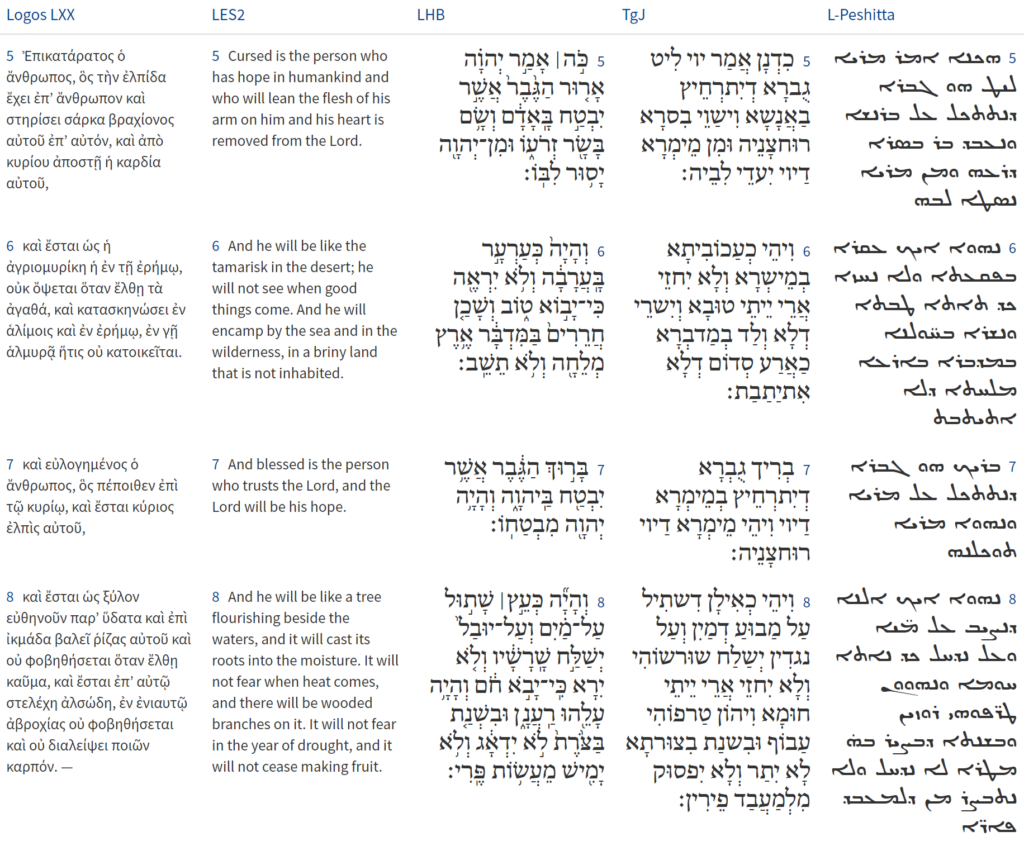
The Greek phrase Ἐπικατάρατος ὁ ἄνθρωπος, ὃς τὴν ἐλπίδα ἔχει ἐπʼ ἄνθρωπον καὶ στηρίσει σάρκα βραχίονος αὐτοῦ ἐπʼ αὐτόν states “cursed is the man who trusted in man, and makes the flesh the strength of his arm.” Here the word βραχίονος means arm and is used elsewhere as an anthropomorphic example of God’s power (Shemot / Exodus 15:16, Isaiah 51:5, 52:10, Tehillim / Psalms 70:18, 76:16). The idea here is this person prefers to trust in himself, as opposed to the arm of the Lord, meaning he does not seek the power of God in his life. Note the text states that such a person prefers his own strength, and the text uses the word זְרֹע֑וֹ meaning “arm” to express the power of God. This word always reminds us of the word זֶרַע which means “seed” which is also used to describe one’s progeny/children according to various places in the Torah concerning Abraham and the promises of God. Note how children are also conceived by the power of God! This analogy draws in even greater consequences to the one who trusts in himself, or the power of man as opposed to God as affecting future generations by leading to one’s children learning these wicked ways turning from life and truth. Not to mention the death of a man due to his sins killing a generation of people (his descendants / children not being born). This is why the verse concludes saying וּמִן־יְהוָ֖ה יָס֥וּר לִבּוֹ “and who turns his heart from the Lord,” the L-Peshitta writes ܘܡܢ ܡܪܝܐ ܢܣܛܐ ܠܒܗ translating the יָס֥וּר using ܢܣܛܐ having the basic meaning “to turn aside from” or “to change direction.” We note how significant this is, when we change direction from the Lord, we are basically facing our backs towards the Lord which is a symbol of disrespect. Jeremiah 17:6 continues describing such a person saying, וְהָיָה֙ כְּעַרְעָ֣ר בָּֽעֲרָבָ֔ה וְלֹ֥א יִרְאֶ֖ה כִּי־יָב֣וֹא ט֑וֹב וְשָׁכַ֤ן חֲרֵרִים֙ בַּמִּדְבָּ֔ר אֶ֥רֶץ מְלֵחָ֖ה וְלֹ֥א תֵשֵֽׁב׃ analogizing such a person to a juniper tree (כְּעַרְעָ֣ר) in the desert (בָּֽעֲרָבָ֔ה) will not see good because it dwells in a Stoney place in the salty land, and he will not remain. The idea here is that salt preserves, but it does so in death. Salt preserves dead things. This preserving property of death causes the man (the juniper) to die and in parallel the one who unites himself with death is the one who trusts in man, in the strength of the flesh/body and so he will have no life and die just as the juniper tree does in an uninhabitable land. On the other hand we read according to Jeremiah 17:7 the text writes, בָּר֣וּךְ הַגֶּ֔בֶר אֲשֶׁ֥ר יִבְטַ֖ח בַּֽיהוָ֑ה וְהָיָ֥ה יְהוָ֖ה מִבְטַחֽוֹ׃ “blessed is the man who trusts in HaShem, and HaShem will be his trust/reliance.” we note the next verse, Jeremiah 17:8, וְהָיָ֞ה כְּעֵ֣ץ׀ שָׁת֣וּל עַל־מַ֗יִם וְעַל־יוּבַל֙ יְשַׁלַּ֣ח שָֽׁרָשָׁ֔יו וְלֹ֤א יִרָא כִּֽי־יָבֹ֣א חֹ֔ם וְהָיָ֥ה עָלֵ֖הוּ רַֽעֲנָ֑ן וּבִשְׁנַ֤ת בַּצֹּ֙רֶת֙ לֹ֣א יִדְאָ֔ג וְלֹ֥א יָמִ֖ישׁ מֵעֲשׂ֥וֹת פֶּֽרִי׃ here Jeremiah contrasts the juniper (כְּעַרְעָ֣ר) which produces berries which may be used for spicing or cooking with a generalized tree or plant (וְהָיָ֞ה כְּעֵ֣ץ) “and be like a tree” that is planted by water and he will stretch out his roots and not be afraid of the heat and will have leaves in the year of drought and will not be anxious ( יִדְאָ֔ג) and will not cease from producing fruit. The TgJ translates וְלָא יִפסוּק מִלְמַעֲבַד פֵירִין “and not end from making fruit” and again here I like the Aramaic translation because knowing Hebrew we recognize words. The word מִלְמַעֲבַד is the Aramaic equivalent of עשה, and means to make/do and here “produce.” What I am reminded of when looking at the Aramaic is the Hebrew word עבד for servant, which mentally draws this idea of being a faithful servant always being fruitful in the fruit of his or her ministry unto God. (Remember how our service or ministry to God involves everything in our lives, from personal / private to public, family, work, etc.) The reason is that he or she is planted beside life giving water. These things Jeremiah is speaking of are to those who call a curse upon themselves and waste what God has provided! The Shabbat according to the Zohar is connected to this as recognizing the importance of resting and taking time to draw near to the Lord, to study His Words, and the Sabbath Day is meant for these things. This is the very thing Isaiah is speaking about in his book. When one trusts in man and the strength of his body, he is calling a curse upon himself because he is trusting in something other than the Lord. This is possible even today and by those who place their faith in Yeshua, but yet trust in man and in the power of the body. The one who does this will suffer the consequences regardless of whether they have faith in Yeshua. The reason being, one is leaning upon their own faculties, the flesh. What is needed is to turn from self-reliance and return to the purity of faith in Yeshua.
Isaiah continues saying the following according to the TgJ, יח יַעדֵי מִינָך יָת מַצנַפתָא וְיַקְפוּנָך בַעְלֵי דְבָב כְשוּר מַקַף וְיַגלֵינָך לַאְרַע פַתיוּת יְדִין תַמָן תְמוּת וּלתַמָן רְתִיכֵי יְקָרָך יְתוּבָן בִקלַן עַל דְלָא טַמַרתָא יְקָר בֵית רִבֹונָך׃ 22:18 He shall take away from thee thy tiara, and the enemies shall enclose thee, like a surrounding wall, and they shall lead thee into captivity into a spacious country, there thou shalt die, and thither the chariots of thy glory shall return in disgrace, because thou hast not preserved the honour of thy master’s house. יט וְאַדחֵינָך מִמְקָמָך וּמִשִימוּשָך אְמַגְרִינָך׃ 22:19 And I will thrust thee down from thy station, and I will divest thee of thy office. כ וִיהֵי בְעִידָנָא הַהוּא וַאְרַבֵי לְעַבדִי לְאַליָקִים בַר חִלקִיָה׃ 22:20 And it shall come to pass at that time, that I will make my servant Eliakim great, the son of Hilkiah. (TgJ) We note the idea of where we work, the Lord God is also involved and we are to remain faithful regardless of where we are or what time of day it is. The Talmud Bavli Kallah Rabbati 8:11 states the following concerning these verses.
Talmud Bavli Tractate Kallah Rabbati 8:11
‘R. Joshua b. Levi said: Every day’, etc. Whence do we know this? For it is written, Hark! the Lord crieth [yiḳra’] unto the city—and it is wisdom to have regard for Thy name.105Micah 6, 9. Perhaps the verse speaks of an ordinary voice [calling and not a Bath Ḳol]? Here it is stated yiḳra’, and elsewhere it is stated, And the Lord called [wayyiḳra’] unto him out of the mountain:106Ex. 19, 3. as there it was [God calling] from Sinai, so here too it is [God calling] from Sinai. Alternately, here it states yiḳra’ and of the tent of meeting it states, And the Lord called [wayyiḳra’] unto Moses, and spoke unto him out of the tent of meeting.107Lev. 1, 1. But it might be argued that here108In Micah 6, 9, where the word ḳol is used, translated hark. it uses the word ḳol and elsewhere it states, God answered him by a voice [beḳol]!109Ex. 19, 19, which seems to imply that it was not God Who spoke. Then quote, Then he heard the Voice speaking.110Num. 7, 89. Here it is clear that God is speaking. [It might also be argued,] Here it states, unto the city111In Micah 6, 9, and therefore the comparison is not complete. and there it does not! [Draw the inference] from the following: Hark [ḳol]! one calleth [ḳore’]: Clear ye in the wilderness the way of the Lord,112Isa. 40, 3. where ‘calling’ and ‘wilderness’ occur, and it is written, They encamped in the wilderness113Ex. 19, 2, which refers to a time before Sinai.—perhaps this refers to the periodical ‘callings’! When it mentions ‘calling’ it implies a regular calling, as it is written, When I call unto them, they stand up together.114Isa. 48, 13. Our Rabbis have taught:115Ber. 55a (Sonc. ed., p. 335). R. Joḥanan there enumerates three things: famine, plenty and leadership. Five things the Holy One, blessed be He, Himself proclaims, viz.: the leader, famine, plenty, the sword, and those who escape the sword. ‘The leader’, as it is written, See, I have called by name Beẓalel.116Ex. 31, 2. ‘Famine’, as it is written, For the Lord hath called for a famine.1172 Kings 8, 1. ‘Plenty’, as it is written, And I will call for the corn and will increase it.118Ezek. 36, 29. ‘The sword’, as it is written, For I will call for a sword.119Jer. 25, 29. ‘Those who escape the sword’, as it is written, And among the remnant those whom the Lord shall call.120Joel 3, 5. It is all right with three since the Divine Name is written in connection with them, but with And I will call for the corn, perhaps [this means] by a messenger, as it is written, I will call my servant Eliaḳim!121Isa. 22, 20. If you do not admit this, surely there [with Eliaḳim] the Divine Presence called to him [to act as leader], because it was similar to that of Beẓalel who was a leader.
We note that the rabbis always draw us back to Torah, here the voice of God calling from Sinai. This speaks to how the Torah is relevant for all generations. The Lord God Almighty is calling out to us from Sinai from the pages of history, and the Talmud warns us how we are to listen to the Lord who speaks from Sinai regardless of what time in history we are in. The Talmud references Bezalel the man from the Torah who was gifted by God in crafting the Tabernacle of God. The same for Eliakim who is gifted to serve in office. The same for each of us who are gifted to work where God currently has us. We note that because of these things, the Apostle Paul wrote what he did according to Colossians 3:23.
Colossians 3:23
3:23 Whatever you do, do your work heartily, as for the Lord rather than for men; (NASB, ܘܟ݂ܽܠ ܕ݁ܥܳܒ݂ܕܻ݁ܝܢ ܐܢ̄ܬܾ݁ܘܢ ܆ ܡܶܢ ܟܾ݁ܠܴܗ ܢܰܦ݂ܫܟ݂ܽܘܢ ܥܒ݂ܶܕ݂ܘ ܇ ܐܱܝܟ݂ ܕܱ݁ܠܡܳܪܱܢ ܁ ܘܠܴܐ ܐܱܝܟ݂ ܕ݁ܠܱܒ݂ܢܱ̈ܝܢܳܫܳܐ ܂ 23 ὃ ἐὰν ποιῆτε, ἐκ ψυχῆς ἐργάζεσθε ὡς τῷ κυρίῳ καὶ οὐκ ἀνθρώποις·)
The Talmud writes “Divine Name is written in connection with them,” and if we consider what we have today in Yeshua and Paul’s words here, how significant is our walking with the Lord and serving him with all our might as Paul wrote? We have the fulfillment of Torah centric principle of God dwelling in our midst, He literally is in us by our faith in our Father in heaven and in Yeshua His Messiah! Because of this, our service to God includes our place of employment, our family, and our community. What does it mean to serve God? Serving God in heaven is accomplished through the demonstration of our love for Him through loving service to others. Loving God with all our heart and loving our neighbor, following in the footsteps of Yeshua as he taught us according to the NT text.
Isaiah continues saying the following according to the TgJ, כא וְאַלבְשִינֵיה כִיתוּנָך וְהִמיָנָך אְזָרְזִנֵיה וְשֻלטָנָך אַתֵין בִידֵיה וִיהֵי לְאָב לְיָתְבֵי יְרוּשלַם וּלבֵית יְהוּדָה׃ 22:21 And I will clothe him with thy robe, and with thy girdle I will gird him, and I will commit thy government into his hand, and he shall be a prince to the inhabitants of Jerusalem, and to the house of Judah. כב וְאַתֵין מַפתַח בֵית מַקדְשָא וְשֻלטָן בֵית דָוִד בִידֹוהִי וְיִפתַח וְלֵית דְאָחֵיד וְיֵיחֹוד וְלֵית דְפָתַח׃ 22:22 And I will place the key of the house of the sanctuary, and the government of the house of David, in his hand; and he shall open, and none shall shut; and he shall shut, and none shall open. (TgJ) When the servant is faithful to the Lord and God exalts his position, we read what we see here in the text. On the other hand, when a man exalts himself, he operates in pride which leads to cruel actions towards others and then a host of sins follow according to the Torah. The Scriptures call us to be humble, and to receive God’s holy word as an innocent child. This is how Yeshua described our being as children according to Matthew 18:3, “And said, Verily I say unto you, except ye be converted, and become as little children, ye shall not enter into the kingdom of heaven.” This is the concept of having a “Childlike faith” which means that we may not understand all of what God wants or says, but we believe like children who do not understand everything yet believing our parents guidance and love. This is how Midrash Sifrei Devarim 321:16 interpretes these things saying the following:
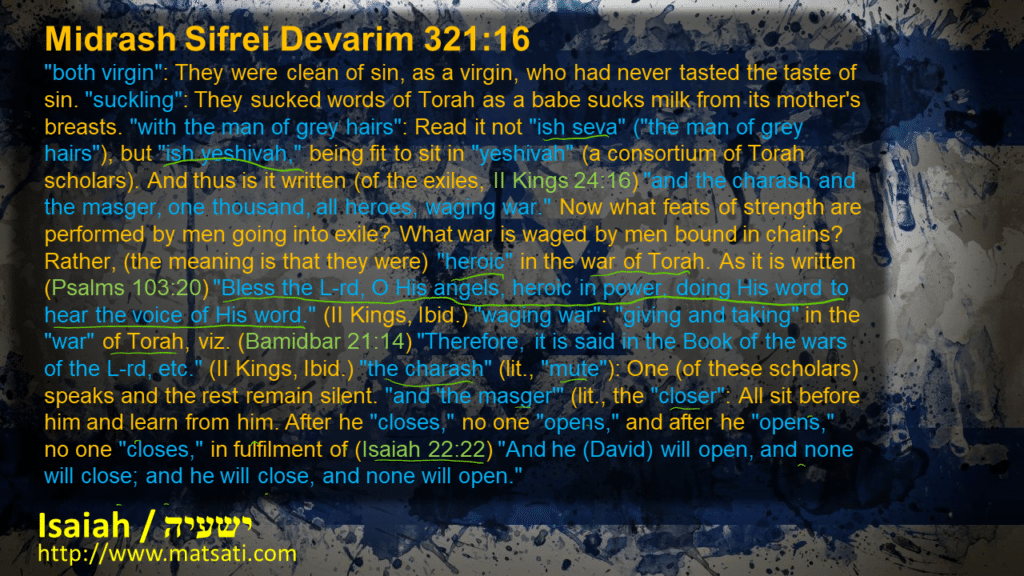
Midrash Sifrei Devarim 321:16
“both virgin”: They were clean of sin, as a virgin, who had never tasted the taste of sin. “suckling”: They sucked words of Torah as a babe sucks milk from its mother’s breasts. “with the man of grey hairs”: Read it not “ish seva” (“the man of grey hairs”), but “ish yeshivah,” being fit to sit in “yeshivah” (a consortium of Torah scholars). And thus is it written (of the exiles, II Kings 24:16) “and the charash and the masger, one thousand, all heroes, waging war.” Now what feats of strength are performed by men going into exile? What war is waged by men bound in chains? Rather, (the meaning is that they were) “heroic” in the war of Torah. As it is written (Psalms 103:20) “Bless the L-rd, O His angels, heroic in power, doing His word to hear the voice of His word.” (II Kings, Ibid.) “waging war”: “giving and taking” in the “war” of Torah, viz. (Bamidbar 21:14) “Therefore, it is said in the Book of the wars of the L-rd, etc.” (II Kings, Ibid.) “the charash” (lit., “mute”): One (of these scholars) speaks and the rest remain silent. “and ‘the masger'” (lit., the “closer”: All sit before him and learn from him. After he “closes,” no one “opens,” and after he “opens,” no one “closes,” in fulfilment of (Isaiah 22:22) “And he (David) will open, and none will close; and he will close, and none will open.”
The idea here is taking in the wisdom of the scriptures with a pure heart and with pure intentions (i.e. the analogy of the virgin). The rabbis speak to a spiritual war, what they call “heroic in the war of Torah.” There is a direct spiritual connection to the events taking place in this world, wars, political offices, sin, and the ideal is to take in the Word of God in innocence, as a baby relies upon his or her mother for sustaining food, so too we are to rely upon the Lord God in heaven. The closing statement of the Midrash in this part quotes Isaiah 22:22 of the one who “closes,” no one “opens,” and after he “opens,” no one “closes.” This speaks to a messianic expectation, and the Midrash analogizes this to David opening and closing and none having the power to change what has happened. The text states, Isaiah 22:22 “And the key of the house of David will I lay upon his shoulder; so, he shall open, and none shall shut; and he shall shut, and none shall open. (וְנָתַתִּי מַפְתֵּחַ בֵּית-דָּוִד עַל-שִׁכְמוֹ וּפָתַח וְאֵין סֹגֵר וְסָגַר וְאֵין פֹּתֵחַ)” The idea of laying upon the shoulder has a parallel to Isaiah 9:6 “…and the government will be on his shoulders…” The keys are what the Messiah is said to have (Revelation 3:7) John writes, “And to the angel of the church in Philadelphia write; These things saith he that is holy, he that is true, he that hath the key of David, he that openeth, and no man shutteth; and shutteth, and no man openeth.” Revelation looks like a direct quote from Isaiah 22:22, and this communicates the one whom God has chosen, exactly like we are seeing here in regard to Shebna and Eliakim. The Lord God Almighty endows the Messiah with power and authority, such that it is through him wisdom and knowledge is communicated, he has the power to “open and shut” the door to the kingdom of heaven, and he is the one who introduces his own people to the kingdom while excluding others who lack faith and faithfulness.
Isaiah continues according to the TgJ saying, כג וַאְמַנֵינֵיה אַמַרכַל מְהֵימָן מְשַמֵיש בַאְתַר קַיָים וִיהֵי לְכוּרסֵי יְקָר לְבֵית אְבוּהִי׃ 22:23 And I will appoint him a faithful chief-governor, an officer in a firm place, and he shall be for a glorious throne to his father’s house. כד וְיִסתַמכוּן עְלֹוהִי כָל יַקִירֵי בֵית אְבוּהִי בְנַיָא וּבנֵי בְנַייָא מֵרַברְבַיָא וְעַד דְעַדקַיָא מִכָהְנַיָא לָבְשֵי אֵיפֹודָא וְעַד בְנֵי לֵוִי אָחְדֵי נְבלַיָא׃ 22:24 All the nobles of his father’s house shall rest themselves upon him, children, and children’s children, from young men to little ones, from the priests clothed with the ephod to the Levites that are holding the lyres. כה בְעִידָנָא הַהוּא אְמַר יוי צְבָאֹות יִעדֵי אַמַרכַל מְהֵימָן מְשַמֵיש בַאְתַר קַייָם וְיִתקְטֵיף וְיִפֹול וְתִבטַל מַטַל נְבוּאְתָא דַעְלֹוהִי אְרֵי בְמֵימְרָא דַיוי גְזִיר כֵין׃ 22:25 At that time, saith the Lord of hosts, there shall be removed the faithful chief governor, who ministered in a firm place, and he shall be cut off, and he shall fall: and there shall be accomplished the burden of prophecy, which was concerning him; because the WORD of the Lord hath so decreed it. (TgJ) Again this speaks to the Lord putting the One of His choosing into office. Rashi writes concerning this in the following way:
Rashi on Isaiah 22,23:1
And I will thrust him like a peg in a sure place (Jonathan renders:) And I will appoint him a faithful trustee, serving in a sure place. Jonathan renders נֶאֱמָן as sure, i.e., a place that is faithful to those who lean on it, for it shall not move. Another explanation is to reverse the word order of the verse: And I will thrust him a sure peg in a place.
We also note something according to the commentary Likutei Moharan, the significance of this interpretation of establishing someone as a peg in a secure place.
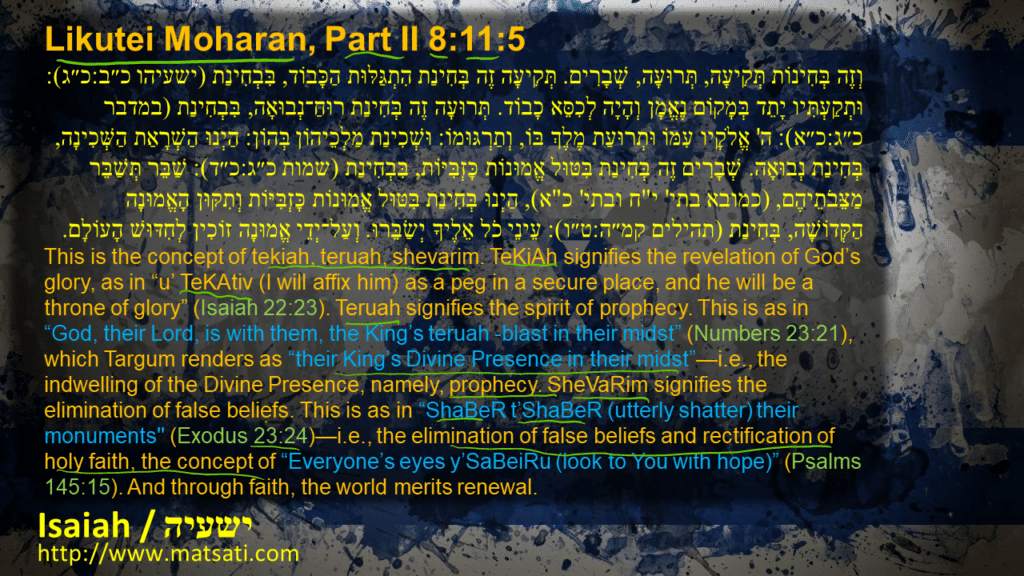
Likutei Moharan, Part II 8:11:5
וְזֶה בְּחִינוֹת תְּקִיעָה, תְּרוּעָה, שְׁבָרִים. תְּקִיעָה זֶה בְּחִינַת הִתְגַּלּוּת הַכָּבוֹד, בִּבְחִינַת (ישעיהו כ״ב:כ״ג): וּתְקַעְתִּיו יָתֵד בְּמָקוֹם נֶאֱמָן וְהָיָה לְכִסֵּא כָבוֹד. תְּרוּעָה זֶה בְּחִינַת רוּחַ־נְבוּאָה, בִּבְחִינַת (במדבר כ״ג:כ״א): ה’ אֱלֹקָיו עִמּוֹ וּתְרוּעַת מֶלֶךְ בּוֹ, וְתַרְגּוּמוֹ: וּשְׁכִינַת מַלְכֵיהוֹן בְּהוֹן: הַיְנוּ הַשְׁרָאַת הַשְּׁכִינָה, בְּחִינַת נְבוּאָה. שְׁבָרִים זֶה בְּחִינַת בִּטּוּל אֱמוּנוֹת כָּזְבִּיּוֹת, בִּבְחִינַת (שמות כ״ג:כ״ד): שַׁבֵּר תְּשַׁבֵּר מַצֵּבֹתֵיהֶם, (כמובא בתי’ י”ח ובתי’ כ”א), הַיְנוּ בְּחִינַת בִּטּוּל אֱמוּנוֹת כָּזְבִּיּוֹת וְתִקּוּן הָאֱמוּנָה הַקְּדוֹשָׁה, בְּחִינַת (תהילים קמ״ה:ט״ו): עֵינֵי כֹל אֵלֶיךָ יְשַׂבֵּרוּ. וְעַל־יְדֵי אֱמוּנָה זוֹכִין לְחִדּוּשׁ הָעוֹלָם.
This is the concept of tekiah, teruah, shevarim. TeKiAh signifies the revelation of God’s glory, as in “u’ TeKAtiv (I will affix him) as a peg in a secure place, and he will be a throne of glory” (Isaiah 22:23). Teruah signifies the spirit of prophecy. This is as in “God, their Lord, is with them, the King’s teruah -blast in their midst” (Numbers 23:21), which Targum renders as “their King’s Divine Presence in their midst”—i.e., the indwelling of the Divine Presence, namely, prophecy. SheVaRim signifies the elimination of false beliefs. This is as in “ShaBeR t’ShaBeR (utterly shatter) their monuments” (Exodus 23:24)—i.e., the elimination of false beliefs and rectification of holy faith, the concept of “Everyone’s eyes y’SaBeiRu (look to You with hope)” (Psalms 145:15). And through faith, the world merits renewal.
Likutei Moharan is the great work of Rebbe Nachman of Breslov (1772-1810) and is a collection of his formal lessons. According to the Rebbe Nachman, תְּקִיעָה Tekiah is Aramaic for the “blowing of the shofar” and signifies the revelation of God’s glory. תְּרוּעָה Teruah means “war cry, alarm, shout for joy” and signifies the spirit of prophecy. שְׁבָרִים Shevarim means “to smash, break” and signifies elimination of false beliefs. He says that the world merits renewal through faith, which is what we see taking place according to the TgJ, כג וַאְמַנֵינֵיה אַמַרכַל מְהֵימָן מְשַמֵיש בַאְתַר קַיָים וִיהֵי לְכוּרסֵי יְקָר לְבֵית אְבוּהִי׃ 22:23 And I will appoint him a faithful chief-governor, an officer in a firm place, and he shall be for a glorious throne to his father’s house. (TgJ) We note that when the people receive a righteous leader, their burden is removed. This illustrates the weight of leadership; how wicked and unrighteous leaders cause a burden upon the people through their unrighteous example. This is exactly what we see taking place today, unrighteous laws that promote LBGTQ, and immorality (abortion) and sexual sin (prostitution). Not to mention how the wicked want to tax their people, placing burden after burden with no regard for the livelihood of the people. This idea of the Lord establishing or appointing the one of His choosing, draws a parallel to what we read in the book of Hebrews.
Hebrews 1:1-3
1:1 God, who at sundry times and in divers manners spake in time past unto the fathers by the prophets, 1:2 Hath in these last days spoken unto us by his Son, whom he hath appointed heir of all things, by whom also he made the worlds; 1:3 Who being the brightness of his glory, and the express image of his person, and upholding all things by the word of his power, when he had by himself purged our sins, sat down on the right hand of the Majesty on high: (KJV, Hebrews 1:1–3 (Peshitta): ܒ݁ܟ݂ܽܠ ܡܢܱ̈ܘܳܢ ܘܰܒ݂ܟ݂ܽܠ ܕܷ݁ܡܘܳܢ̈ ܁ ܡܰܠܷܠ ܐܱܠܴܗܳܐ ܥܰܡ ܐܱܒ݂ܳܗܰܝ̈ܢ ܒܱ݁ܢ̈ܒ݂ܺܝܶܐ ܡܶܢ ܩܕ݂ܺܝܡ ܂
2 ܘܰܒ݂ܗܳܠܷܝܢ ܝܱ̈ܘܡܳܬ݂ܴܐ ܐ̱ܚܪܴ̈ܝܶܐ ܁ ܡܰܠܷܠ ܥܰܡܰܢ ܒܱ݁ܒ݂ܪܷܗ ܂ ܕ݁ܠܷܗ ܣܳܡ ܝܳܪܬܴ݁ܐ ܕ݁ܟ݂ܽܠܡܶܕܷ݁ܡ ܂ ܘܒ݂ܶܗ ܥܒ݂ܰܕ݂ ܠܥܳܠܡܷ̈ܐ ܂
3 ܕ݁ܗܽܘܝܽܘ ܨܷܡܚܳܐ ܕ݁ܫܽܘܒ݂ܚܶܗ ܁ ܘܨܱܠܡܳܐ ܕܻ݁ܐܝܬ݂ܾܘܬ݂ܷܗ ܁ ܘܰܐܚܺܝܕ݂ ܟܾ݁ܠ ܒ݁ܚܰܝܠܴܐ ܕ݁ܡܶܠܬ݂ܷܗ ܂ ܘܗܽܘ ܒܱ݁ܩܢܽܘܡܶܗ ܥܒ݂ܰܕ݂ ܕܾ݁ܘܟܴ݁ܝܳܐ ܕܱ݁ܚܛܴܗܰܝ̈ܢ ܘܺܝܬ݂ܷܒ݂ ܥܰܠ ܝܰܡܺܝܢܳܐ ܕ݁ܪܱܒܾ݁ܘܬ݂ܴܐ ܒܱ݁ܡܪܱ̈ܘܡܶܐ ܂ 1 Πολυμερῶς καὶ πολυτρόπως πάλαι ὁ θεὸς λαλήσας τοῖς πατράσιν ἐν τοῖς προφήταις 2 ἐπʼ ἐσχάτου τῶν ἡμερῶν τούτων ἐλάλησεν ἡμῖν ἐν υἱῷ ὃν ἔθηκεν κληρονόμον πάντων, διʼ οὗ καὶ ἐποίησεν τοὺς αἰῶνας, 3 ὃς ὢν ἀπαύγασμα τῆς δόξης καὶ χαρακτὴρ τῆς ὑποστάσεως αὐτοῦ, φέρων τε τὰ πάντα τῷ ῥήματι τῆς δυνάμεως αὐτοῦ, καθαρισμὸν τῶν ἁμαρτιῶν ποιησάμενος ἐκάθισεν ἐν δεξιᾷ τῆς μεγαλωσύνης ἐν ὑψηλοῖς)
Yeshua himself said according to Matthew 28:18, And Jesus came and said to them, “All authority in heaven and on earth has been given to me.” (ESV) Here in Hebrews 1:1-3 the author writes how Yeshua is through whom God had spoken in these last days. It was through Him that all things were created, and He is the expression of God’s glory holding all things by the power of his word. The parallel here is strikingly similar to what we read of Eliakim in Isaiah, and to the rabbinic interpretation of the establishing of one as a secure peg that cannot be removed. This is how Yeshua is described, as the chosen one sent by God into the world to save us from our sins. The scripture always draws us back to this point, of God sending His anointed one into the world, to lead us into all truth, and of the Lord God dwelling in our midst, our being His people and He being our God. This is the glory of our God, the God of Abraham, the God of Israel, who loves us and seeks us out. Praise the Lord for His mercy and grace!
